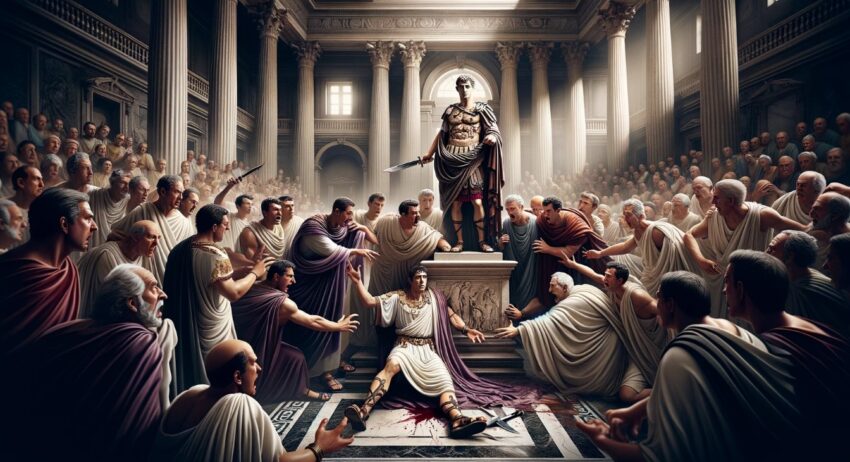Power Vacuum and Immediate Political Chaos
The assassination of Julius Caesar created a sudden and profound power vacuum in Rome, leading to immediate political chaos. The abrupt removal of such a central figure left Rome without a clear leader, and the Senate, already fragmented by internal divisions, struggled to regain control. Historians have documented the ensuing turmoil that characterized this critical juncture in Roman history.
Suetonius, in his biography of Caesar, notes that the conspirators were unprepared for the aftermath of their act. Their plan to restore the Republic faltered as they failed to provide a cohesive alternative to Caesar’s leadership. The Senate, lacking a strong and unifying presence, descended into factionalism, with various groups vying for influence and control.
Plutarch describes how Mark Antony, Caesar’s loyal supporter and consul at the time, quickly moved to consolidate power. Antony’s actions, including seizing Caesar’s papers and treasury, positioned him as a key figure in the unfolding power struggle. His initial attempts to broker peace between the Senate and Caesar’s supporters were complicated by his own ambitions and the growing rivalry with other power players.
According to Appian, the power vacuum also emboldened other ambitious individuals. Octavian, Caesar’s grandnephew and adopted heir, emerged as a significant contender. Despite his youth and relative inexperience, Octavian’s claim to Caesar’s legacy provided him with considerable support, particularly among the legions loyal to Caesar. The political landscape became increasingly complex as Octavian, Antony, and other leaders like Lepidus formed shifting alliances.
Dio Cassius offers a detailed account of the immediate political chaos that followed Caesar’s death. He highlights the rapid disintegration of the conspirators’ unity, as personal ambitions and mutual distrust eroded their initial cooperation. Brutus and Cassius, key figures in the assassination, found themselves isolated and eventually forced to leave Rome, further destabilizing the situation.
Nicolaus of Damascus underscores the broader societal impact of the power vacuum. He notes that the sudden absence of Caesar’s authority led to widespread uncertainty and disorder. Rome, already strained by economic and social issues, saw an increase in crime and unrest as various factions sought to capitalize on the instability. The urban populace, left without the guidance of a central figure, became increasingly volatile.
Historians like Livy emphasize that the power vacuum created by Caesar’s death was not merely a political crisis but a profound societal upheaval. The Roman Republic, already weakened by years of internal conflict and power struggles, could not easily revert to its previous form of governance. The ensuing chaos highlighted the deep-seated issues within the Roman political system and set the stage for the eventual rise of the Roman Empire.
In conclusion, the power vacuum and immediate political chaos following Julius Caesar’s assassination were characterized by a lack of leadership, factional infighting, and societal instability. Historians provide a vivid portrayal of this turbulent period, illustrating how the removal of a central figure can precipitate widespread disorder and fundamentally alter the course of history.
 |
 |
 |


